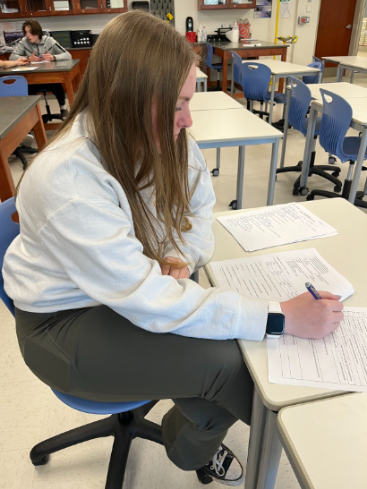WOODBURY — NHS students have noted the desire to have added flexibility in their schedules, wishing for a schedule that no longer limits student ability to take elective courses.
“A lot of people want to take more electives because it would be good to have more of them on their portfolio for college,” said junior Dan Coyle. “But, as an upcoming senior I feel it’s just stretching out our schedule.”
Coyle is among the many agriscience students who must allot the majority of their schedule to agriscience required courses, and thus aren’t able to fit exploratory electives. While an added class would be a welcome addition to many students, there are downsides such as class times will need to be shortened in order to accommodate more courses.

“The eight period schedule will interrupt my work ethic and class time,” said junior Gabriella D’Agostino. “Though the beginning of school may start reasonably , my work ethic will fall behind as the year goes on with the added 8th period classes in a shorter amount of time.”
With additional work with an added class comes an added workload. Many students foresee this as a potential problem.
“Classes also won’t be as long, meaning there will be less time to complete more assignments per class,” D’Agostino adds.
The decreased class time isn’t the only factor on people’s minds. On the brighter side, both faculty, and student advisory committees have met to discuss the change at hand.
“We’ve talked a little bit about some of the current restrictions and benefits of the 7 period schedules,” said Principal Dr. Mykal Kuslis. “Primarily the conversation is there are some students who have some needs, like those who are taking a foreign language, arts, or especially the kids in Ag, and some of the limitations of their schedule.”
“If you have 8 periods it allows more flexibility and puts classes in different places,” Kuslis adds. “It also opens up opportunities for kids in terms of their different classes.”
The flexibility that the 8 period schedule would allow has a strong chance of benefiting those who have full schedules, especially underclassmen.
“9th and 10th graders don’t really have study halls right now; their schedules are pretty full,” said Kuslis. “So, giving them some flexibility and some time to really get through their work and not have to take as much stuff home was one of our big things.”
“I prefer the 4 by 4 block days, it gives students less classes to worry about each day,” said Tricia Marrone, NHS Math Instructor. “I personally can be more productive by focusing more on 3 classes then 7 or 8.”
As speculation begins, anticipation of what’s to come increases. Despite the various views, students and staff continue to move with the current flow of the schedule, and make the best of what they have, but are prepared for the challenges–and opportunities– that might be ahead.











